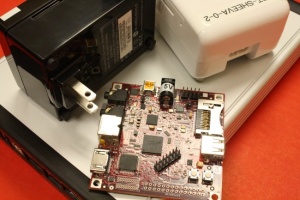From Fedora Project Wiki
m (Scaled photo and added caption.) |
m (Improved caption) |
||
| Line 1: | Line 1: | ||
[[File:091-IMG_4134.JPG.medium.jpeg|right|300px|thumb|Examples of ARM develoment systems, including a SheevaPlug, GuruPlug, BeagleBoard, and OpenRD-Client. These systems typically consume under | [[File:091-IMG_4134.JPG.medium.jpeg|right|300px|thumb|Examples of ARM develoment systems, including a SheevaPlug (white box), GuruPlug (black box), BeagleBoard (bare PCB), and OpenRD-Client (silver box). These systems typically consume under 5 watts each.]] | ||
= Introduction = | = Introduction = | ||
ARM chips are the most widely-produced processor family in the world; they have historically been used in cell phones and embedded applications, and are increasingly used in tablet devices and low-power-consumption servers. | ARM chips are the most widely-produced processor family in the world; they have historically been used in cell phones and embedded applications, and are increasingly used in tablet devices and low-power-consumption servers. | ||
Revision as of 21:24, 24 November 2010

Introduction
ARM chips are the most widely-produced processor family in the world; they have historically been used in cell phones and embedded applications, and are increasingly used in tablet devices and low-power-consumption servers.
The Fedora-ARM project is an initiative to bring Fedora to this processor family.
Communication
- Mailing list: arm@lists.fedoraproject.org (archives)
- IRC: #fedora-arm on Freenode
Resources
Detailed information on Fedora-ARM:
